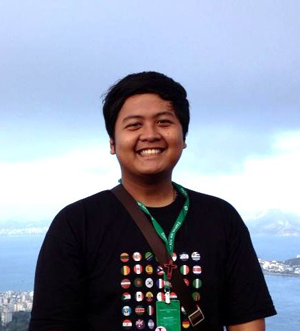Indonesia: Dion’s Empathy
11 June 2015|Dionisius Waskita Cahya Gumilang

Thursday, June 11th, 2015 – Dion is a staff of JRS Indonesia who is assigned at Manado project to assist asylum seekers in Manado Immigration Detention Centre (IDC). On 29th January 2015, a radio interview with Dion was initiated by Father Rheinner Saneba Pr and Montini Radio Manado 106 FM. On the occasion, Dion shared his experience and reflection upon his involvement with JRS:
When did you start working with JRS and what was your main motivation?
I started assisting asylum seekers in Manado IDC in January 2015. But earlier, I joined JRS as volunteer for urban refugees who lived in community housing in Bantul, Yogyakarta. The experiences I gained during my time of volunteering sparked my motivation to get more involved in the issue of refugees and asylum seekers. Particularly, the motivation came when I taught English to refugees. I found their perseverance despite being in a very difficult situation hugely inspiring. Despite all the hardships they had gone through, they were still able to feel grateful and to show hospitality towards newcomers.
I might have been their teacher but the refugees taught me more about their life lessons and values. No matter how difficult their situation was, they still greeted us teachers with a smile. They were open to share many stories too. Many, or even the majority of the stories were about despair and sorrow. I feel touched, yet at the same time embarrassed about taking things in my life for granted.
This became my main motivation to get more involved with JRS. Apart from that, my educational background was very much connected with the issues of human rights.
Based on the principle that knowledge is only as good as dead wood if you don’t put it into practice, I then decided to accept the challenge JRS offered to me.
What has been your most memorable experience with JRS? Have you ever encountered a difficult situation and how did you manage it?
I learned so much about the importance of accompaniment when I taught English to the refugees. One experience that had a significant impact on me was when I taught an elderly refugee from Afghanistan. He was probably at the same age as my grandfather. He had fled from his country to seek asylum from what was a life-threatening situation in Afghanistan. He could not speak English at all. So I started with teaching him the alphabet, which turned out to be very difficult for him to understand. However, his determination to learn made me even more motivated to help him.
Regardless of his limited ability to absorb the study material, he put in lots of effort to learn the alphabet. This experience taught me about the value of perseverance. People have the option either to give up or to stand up. Mr. Hakeem* chose to stand up and do what he could.
The most difficult experience at Bantul was when I had to teach a refugee with learning difficulties that found it hard to communicate.
What is your hope for the people you assist now, and also refugee issues in terms of the Indonesian government and wider public?
My hope is that the asylum seekers whom I assist now will have their dream come true of being resettled in a safe country. They have struggled so much in their life and I hope God will grant their wishes. Although at the moment they still need to wait patiently.
I also hope that during their waiting time in Indonesia, they are able to participate in many positive activities, to help alleviate all the pain and sorrow they have experienced.
I hope JRS’ continuing presence will bring more insight for the Indonesian government in relation to refugee and asylum seeker rights. I hope it also helps to educate and build tolerance amongst the local communities, as well as motivate young people with a social conscience to help those who are less fortunate.
Pope Francis in his message for the World Day of Migrants and Refugees 2015 said that Jesus Christ is always waiting to be recognised in migrants and refugees. Hopefully, JRS’ presence will initiate larger public awareness and understanding of their plight.
*Name has been changed to protect his identity.


